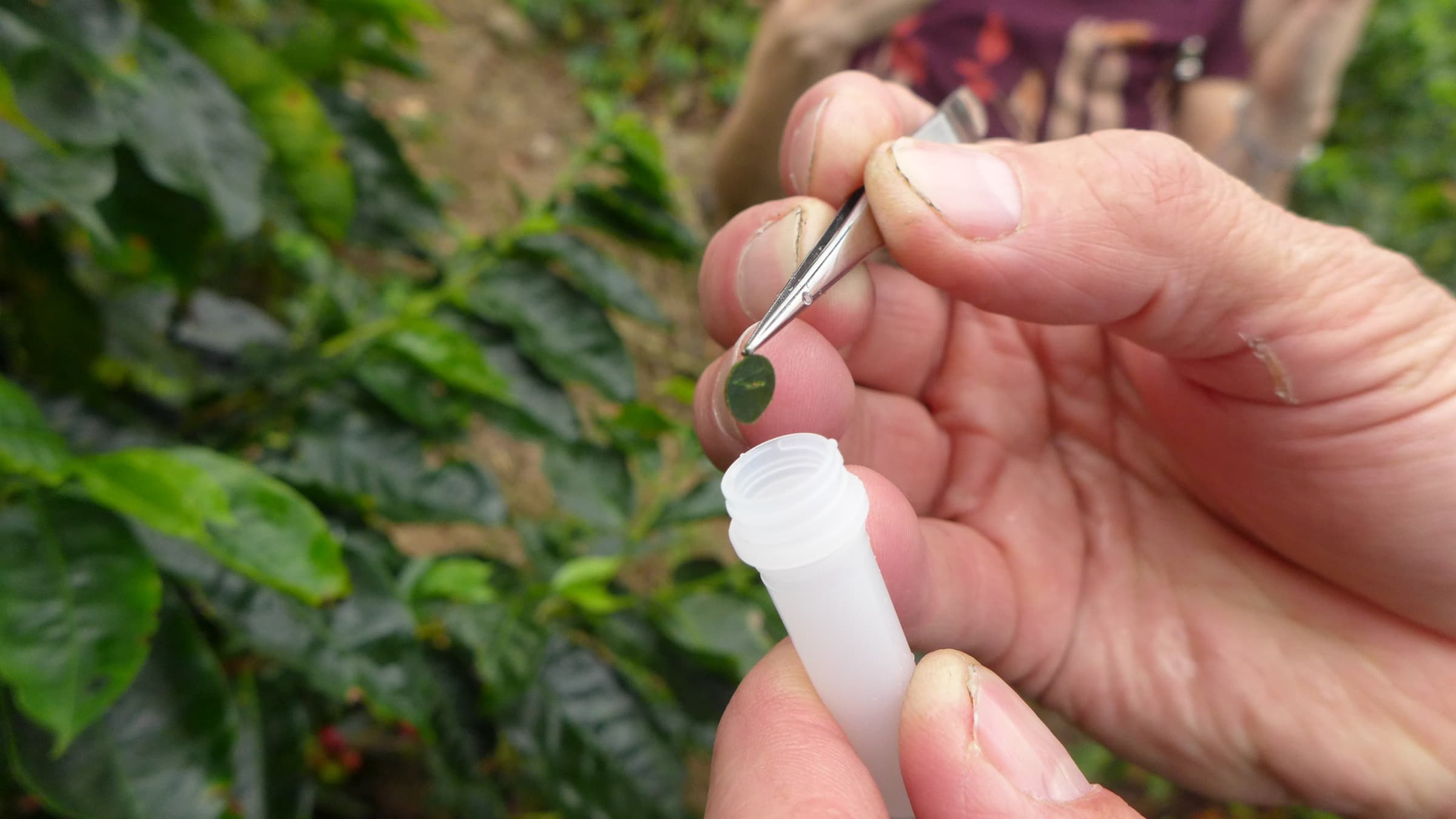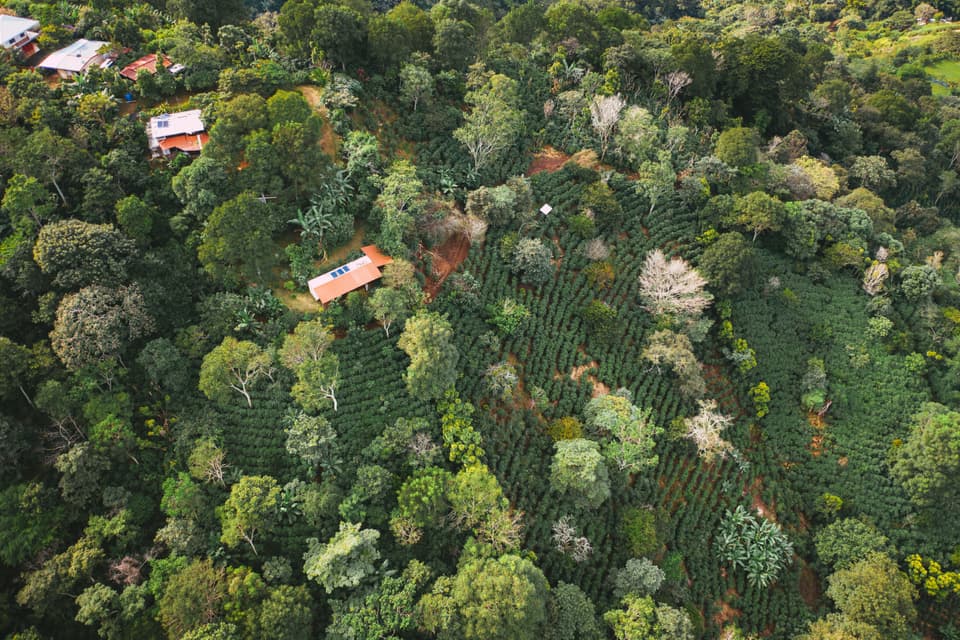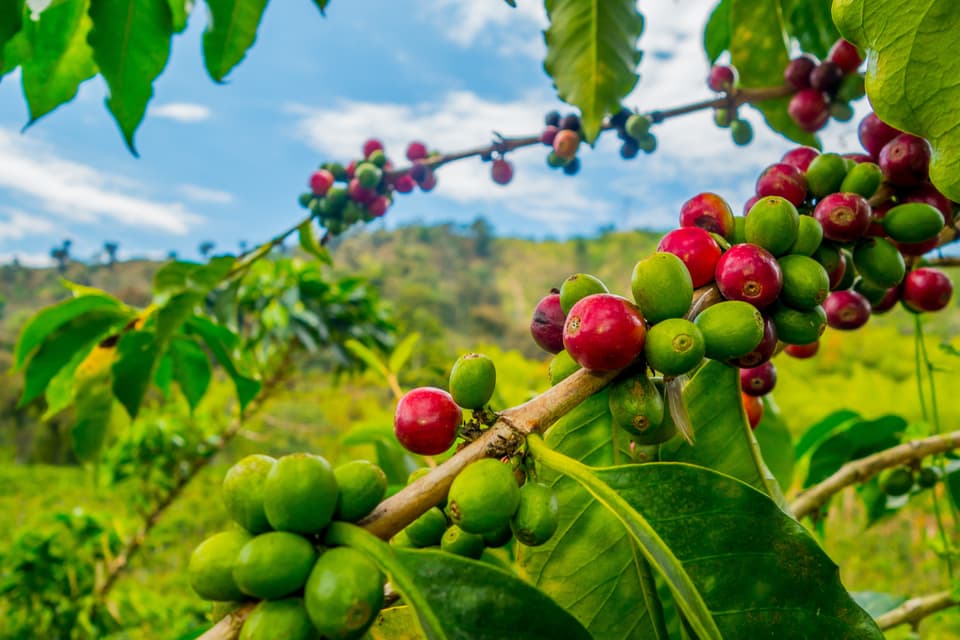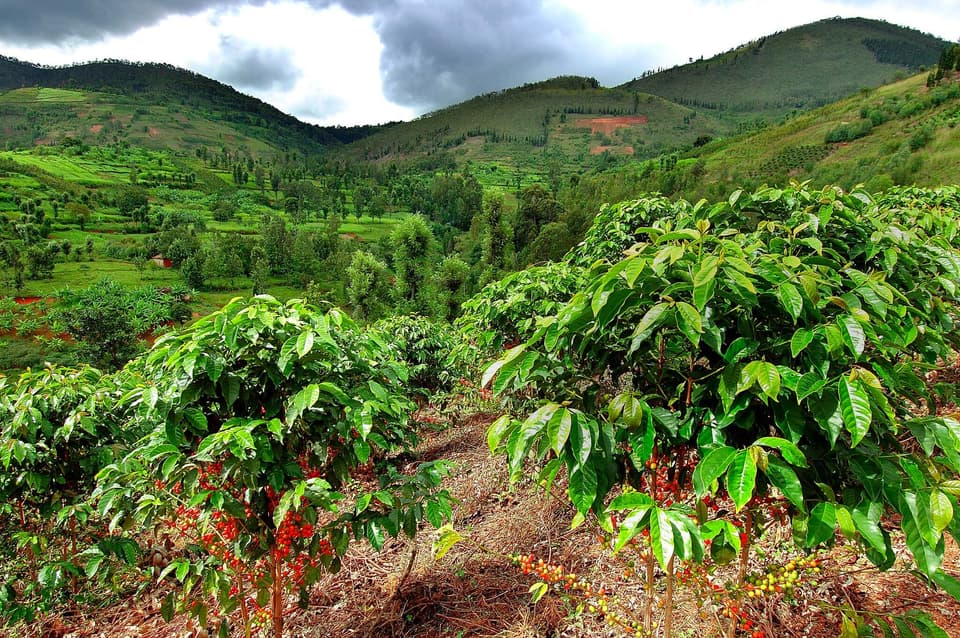Breeding tools
Problem
Breeding tools are technologies and methods used by plant breeders to develop new and improved crop varieties. They help breeders understand the genetic makeup of plants, select the best parents for crossing, and identify promising offspring faster and more accurately. Coffee has lagged behind other crops in the development of modern breeding tools to support lower cost, higher-precision breeding to bring genetic improvement to farmers faster.
Solution
When breeders are armed with low-cost, high-powered genotyping and phenotyping tools and are able to map genetic markers to important traits, modern breeding becomes possible. WCR works collaboratively with expert scientists around the world to develop precision breeding tools. With these, coffee breeders can enhance:
- Speed: Breeding takes years or decades. Tools like genotyping allow faster identification of superior plants.
- Precision: Breeding tools reduce guesswork, increasing the chance of developing varieties with multiple desired traits.
- Efficiency: Save time, land, and money by reducing the number of plants that need to be grown and tested in the field.
- Adaptation: Enable the development of varieties better adapted to changing climates, pests, and diseases.
- Impact: Create impact at scale for millions of farmers who depend on better plants to sustain their productivity and livelihoods.
Tools under development
Genotyping
A global mid-density SNP panel. Determining the genetic makeup of a plant—otherwise known as its “genotype”—is critical for designing efficient breeding schemes. WCR is leading the charge to develop rapid, reliable, accurate and affordable genotyping tools for both arabica and robusta.
Recent technological advances have created accurate, repeatable, inexpensive, and rapid options for the genetic identification of plants. A method of testing that analyzes the presence of single-nucleotide polymorphism (SNP) markers has become the method of choice for genotyping in many plant species. The pattern of these tiny variations dispersed through a plant’s DNA sequence can be used to create a genetic “fingerprint” for a variety. SNP markers are accurate and can be analyzed quickly and at much lower cost than other genetic markers. Because of these advantages, SNPs have become the marker of choice for variety identification in plants.
World Coffee Research, in partnership with plant breeders and genomics experts from around the world, are developing SNP-based genotyping tools. A mid-density SNP panel of around 5,000+ SNP markers provides a detailed "fingerprint," which can be used to understand the genetic relatedness of different coffee plants. This is a powerful tool that will be used by plant breeders and scientists who are analyzing the genetic diversity of coffee and designing more efficient breeding schemes for the development of new varieties that respond to farmer and buyer demand. Such tools can open up new vistas to advance breeding for complex traits, including yield and cup quality, which have historically been difficult to handle based solely on phenotype data. This tool is being developed in collaboration with coffee breeders from around the world and will be made publicly available to the scientific community via the Excellence in Breeding platform. Similar mid-density panels have been developed and deployed for critical food crops, including rice, wheat, potato, cowpea, and groundnut—and now coffee breeders worldwide will benefit from access to the platform, too.
Partners involved in the development of this tool include: USDA/ARS (United States), Cenicafe (Colombia), ICAFE and CATIE (Costa Rica), EPAMIG/EMBRAPA (Brazil), RAB (Rwanda), and DaRT (Australia).
Phenotyping
Rapid identification of key traits. Phenotyping tools are those used to measure a plant’s observable traits, like height, yield, flavor, or resilience under stress. The efficiency of breeding programs can be enhanced by using high-volume/low-cost methods for phenotyping traits of interest. For example, using drones imagery and AI to identify disease prevalence in breeding populations, or high-throughput protocols for measuring and predicting coffee cup quality in breeding.
Marker identification
In addition to genotyping tools, it’s also critical to build maps that allow breeders to associate specific elements of a plant's genetic makeup to important observable traits (the plant’s phenotype), such as whether the plant is susceptible to specific diseases, is tall or short, is high yielding or low yielding, and has good cup quality or poor cup quality. Use of markers can enhance the efficiency of breeding for certain traits. WCR is working with research partners to identify key genetic markers linked to traits of interest.
Breeding program modernization
Breeding Program Assessment Tool (BPAT) for Coffee. WCR worked with the University of Queensland to create a coffee-specific BPAT available to any coffee breeding program in the world to use to evaluate their breeding capacity. A BPAT is an assessment tool that facilitates a structured review of key technical, capacity and management components of plant breeding programs. It was developed by the University of Queensland. Over 50 breeding programs worldwide have used the BPAT to guide improvements for crops including rice, cassava, maize, beans, and bananas. The BPAT process support countries to generate new varieties for their farmers and ensure long-term, stable supply for industry.
- Read more about the Breeding Program Assessment Tool developed by the University of Queensland. Any countries interested in evaluating their breeding program using the BPAT tool can contact info@worldcoffeeresearch.org and we will help put you in touch with the BPAT team.
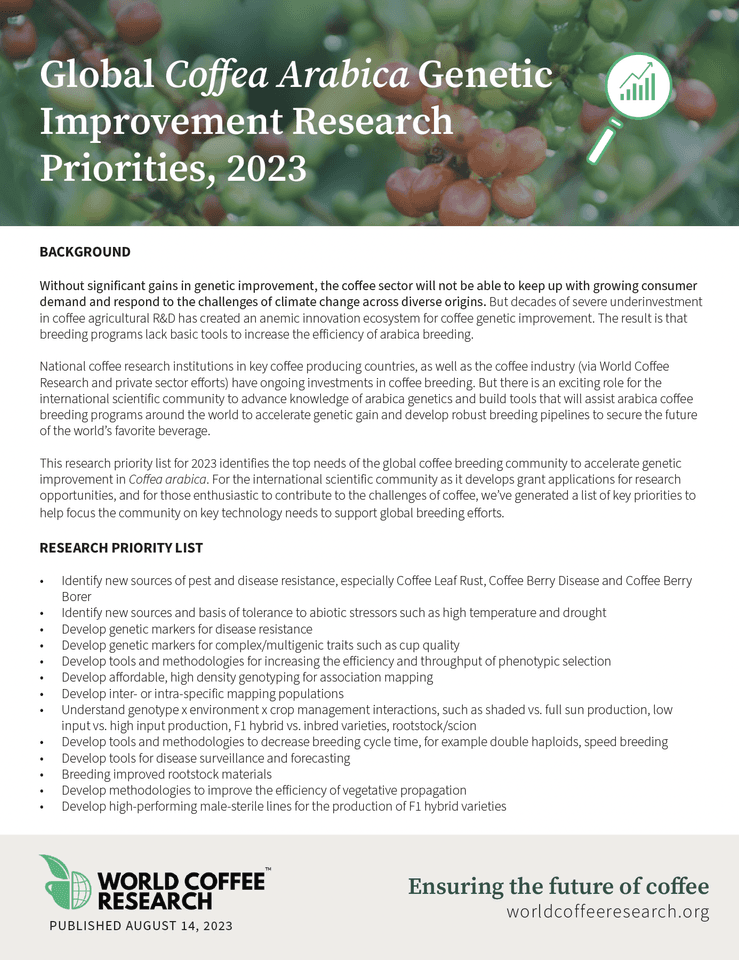
Global Coffea Arabica Genetic Improvement Research Priorities, 2023
Molecular breeding ≠ genetic modification
WCR has a strong policy against genetic modification. WCR does not use genetic engineering or gene editing techniques of any kind in its breeding programs.
So what is "molecular breeding" if it is not genetic modification? It's the use of genetic information to make breeding decision-making more accurate and efficient. This powerful data has been used to decide which plants to cross together. After this, WCR's breeders use the same technology used by breeders 100 years ago—a paintbrush to transfer pollen from one coffee plant to another.
Using molecular breeding approaches, breeders “peek inside” a plant’s genetics to find genes or markers associated with important traits, which can be done with very young plants. Breeders use genotyping to choose which plants to mate with others when making new crosses, focusing on those that have markers associated with desired performance traits. Instead of planting thousands of plants in a field and waiting 3-7 years to validate which individual and offspring perform best, breeders can genotype plants that are only a few months old to see which have the desired genetic markers. This enables the early selection of high-value candidates, saving essential time and cost. In some cases breeders can even analyze the genetic profiles of individual seeds and subsequently select which to sow and which to disregard, saving them a great deal of time and labor.
This article explains how fruit and vegetable breeders are using these approaches to create tastier, healthier products without using genetic modification.
The mid-density SNP panel will be openly available as soon as the development is finalized and the panel is validated, by the end of 2025.
Contact info@worldcoffeeresearch.org and we will help put you in touch with the BPAT team at the University of Queensland.
